Secondhand Smoke | FAQ | “Ask Your Landlord” media campaign
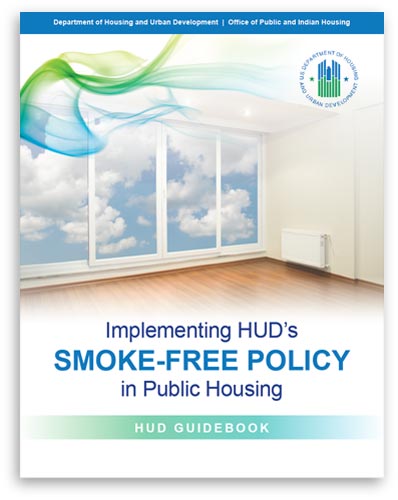 US-HUD SMOKE-FREE PUBLIC HOUSING RULE
US-HUD SMOKE-FREE PUBLIC HOUSING RULE
Effective July 1, 2018. New rule protects health and safety of residents, saves PHAs millions of dollars in preventable damage.
HUD Website for Smoke-Free Public Housing and Multifamily Properties
• HUD Smoke-free Public Housing Resources
• Public Health Law Center toolkit page
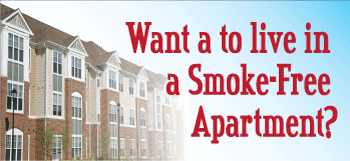
Ask your landlord about the smoking policy before you sign a lease!
Do you want a smoke-free home? If just one neighbor smokes secondhand smoke will enter your apartment and your home will no longer be smoke-free.
Ask your landlord to explain the smoking policy before you sign a lease.
If you want a smoke-free home, you must be in a smoke-free building. Avoid surprise. Know the smoking policy before you sign a lease. 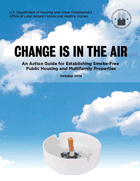
The U.S. Department of Housing and Urban Development (HUD) encourages all public housing authorities and subsidized market-rate multi-unit housing to adopt a smoke-free policy. Click here to download the HUD Smoke-Free Action Guide (Oct. 2015, PDF 2.5MB)
Tenants:
» Smoke-Free Housing in Tompkins County
» Click here for NYS listings by county or ZIP code.
» Click here for information about exposure to Secondhand Smoke
» Have questions? Click here for an FAQ.
Landlords:
» Want to list a smoke-free apartment? Click here to list your smoke-free rental on SmokeFreeHousingNY.
» Click here for more resources on SmokeFreeHousingNY.
Click here for Smoke-Free Housing for New York. Lots of resources for both tenants and landlords!
Click here to see components of the Ask Your Landlord media campaign from June 2015.
When One Person Smokes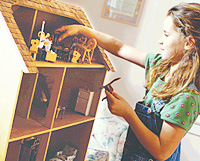
The Whole Building Smokes
- There is no safe level of exposure to secondhand smoke.
- Secondhand tobacco smoke can never be isolated in one apartment or room.
- Tobacco smoke travels under doors, through air ducts and windows, and into your apartment or hallway.
- Air filters or air purifiers do not eliminate the dangers of secondhand smoke. Towels and door sweeps do not block secondhand smoke.
- Secondhand smoke is especially harmful to your children's health.
- Secondhand smoke is harmful to you, your family, and your pets
- Secondhand smoke can cause a heart attack or stroke, and is an asthma trigger.
What about thirdhand smoke?
- THIRDHAND SMOKE is the residue that sticks to clothing and furniture.
- Thirdhand smoke contains 250 chemicals and has similar effects to LEAD POISONING
- It is highly toxic to children & triggers asthma
 How to avoid secondhand smoke
How to avoid secondhand smoke
- Don't allow smoking in your home or car
- Don't allow smoking around your children or pets
- Insist that visitors smoke outdoors, a good distance from the building
- Read your lease. Ask about the smoking policy for your building
- Talk to your landlord. Ask your neighbors to smoke outdoors
- Many apartment buildings and multi-unit houses are becoming smoke-free.
Links
Smoke-Free Housing for New York
U.S. Department of Housing and Urban Development (HUD)
> Smoke-Free Multi Family Housing Toolkit
Oregon Smokefree Housing Project
> How the Housing Authority of Portland Adopted a Smoke-Free Policy
Smoke-Free Housing FAQ for tenants
The answers given here are shortened for quick viewing. To see the complete answer, click here to download the PDF!
Q. Is it legal to ban smoking in an apartment building or condominium?
A. Yes. It is completely legal for a landlord or condominium association to make their units and buildings smoke-free.
Q. Does this mean that smokers can’t live there?
A. No. Smoke-free housing policies only restrict smoking, not smokers. Residents and their guests must not smoke in any smoke-free areas, but a smoke-free policy does not limit who can live in or visit an apartment.
Q. What can I do about secondhand smoke that enters my living space?
A. If secondhand smoke is drifting into your apartment, your health may be at risk. Talk to your neighbors and ask them to help you advocate for a smoke-free policy. Here are some suggestions:
- Document the problem carefully. Write down from where and when smoke is coming into your apartment.
- Circulate a petition among the tenants and ask for their support of a smoke-free policy.
- If you have a medical condition made worse by exposure to secondhand smoke, ask your doctor to document this in writing and give you a copy.
- Put all of your requests to your landlord in writing, and keep copies of everything. Include the medical note, if applicable.
Q. I have health problems. Can I request a Reasonable Accommodation?
A. In most types of housing, the federal Fair Housing Act prohibits discrimination against people with disabilities.
If you have special sensitivities to smoke, severe allergies, respiratory ailments or chronic heart disease, you may have a qualifying disability and you may be able to ask for "reasonable accommodations" to allow you to use your housing like everyone else.
If you have a disability that is affected by secondhand smoke, and secondhand smoke is preventing you from having equal access to your housing, you might be able to request a reasonable accommodation, such as smoking restrictions for your building or being moved to a smoking-restricted building.
Q. My landlord says that as long as I don’t smoke in my apartment I should not worry about the small amount of secondhand smoke that comes in from other units. Is that true?
A. No, that is false. There is no safe level of secondhand smoke according to the U.S. Surgeon General. Existing ventilation and air filtration systems are largely ineffective in preventing the seepage of secondhand smoke or removing the toxins from it.
Q. Are there any other advantages to smoke-free apartment policies?
A. Yes! Smoke-free policies save money and make buildings safer for property owners and tenants alike.
Many landlords and property managers would like to make their buildings smoke-free but worry about whether residents will be supportive.
A smoke-free policy saves hundreds of dollars on cleaning and repainting costs.
Smoking is one of the leading causes of household fires and the #1 cause of fire deaths in the United States.
Q. How are smoke-free policies enforced?
A. Just as any other lease rule like noise or pets, they are largely self-enforcing. Landlords and property managers need to respond promptly to reports of violations, especially when the policy is new.
Q. What can I do if my landlord or condominium association will not establish a smoke-free policy?
A. If smoking is allowed in your building, you can still take an important step by making your own home smoke-free. Then you need to decide if you wish to relocate to a building that has a smoke-free policy in effect.
“Ask Your Landlord” Media Campaign
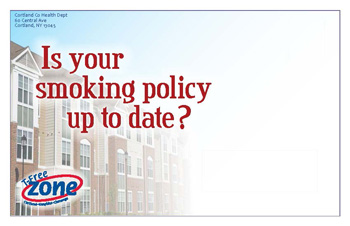
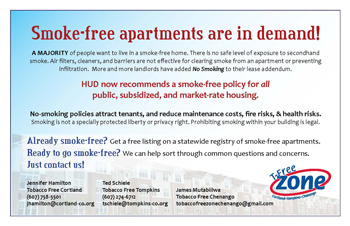
Mailer, 8-1/2" x 5-1/2" (PDF low resolution, 508KB)
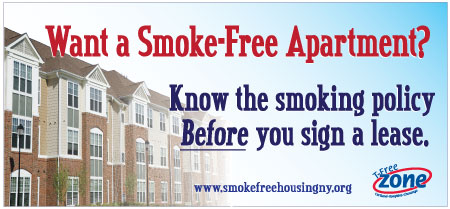
Billboard (PDF low resolution, letter size, 554KB)
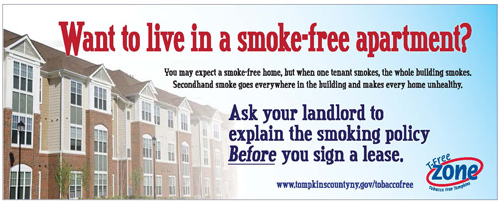
Transit bus poster (PDF low resolution, letter size, 2.54MB)
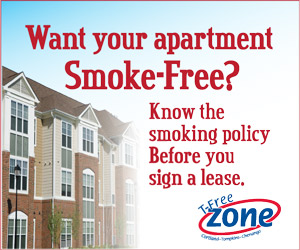
Web ad, 300x250px
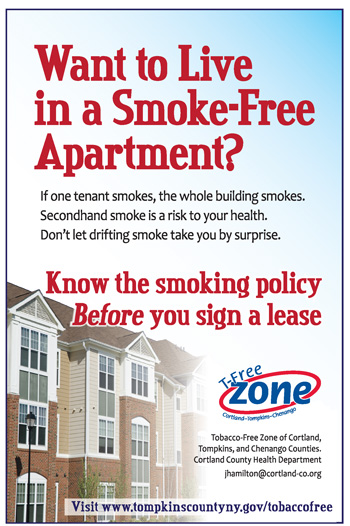
Shopper Ad, quarter page tabloid format (PDF, 1.41MB)
Radio 30 second 1 (mp3)
Radio 30 second 2 (mp3)
Radio 30 second 3 (mp3)
Send me an email for more info or high resolution files
